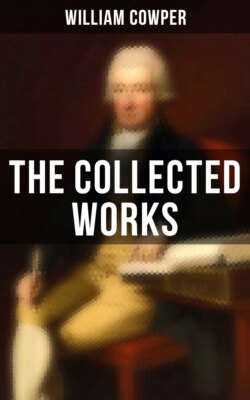Читать книгу The Collected Works - William Cowper - Страница 273
На сайте Литреса книга снята с продажи.
TO THE REV. WILLIAM UNWIN.
ОглавлениеTable of Contents
Olney, April 5, 1784.
My dear William—I thanked you in my last for Johnson; I now thank you with more emphasis for Beattie, the most agreeable and amiable writer I ever met with—the only author I have seen whose critical and philosophical researches are diversified and embellished by a poetical imagination, that makes even the driest subject and the leanest a feast for an epicure in books. He is so much at his ease too that his own character appears in every page, and, which is very rare, we see not only the writer but the man; and that man so gentle, so well-tempered, so happy in his religion, and so humane in his philosophy, that it is necessary to love him if one has any sense of what is lovely. If you have not his poem called the Minstrel, and cannot borrow it, I must beg you to buy it for me; for, though I cannot afford to deal largely in so expensive a commodity as books, I must afford to purchase at least the poetical works of Beattie. I have read six of Blair's Lectures, and what do I say of Blair? That he is a sensible man, master of his subject, and, excepting here and there a Scotticism, a good writer, so far at least as perspicuity of expression and method contribute to make one. But, O the sterility of that man's fancy! if indeed he has any such faculty belonging to him. Perhaps philosophers, or men designed for such, are sometimes born without one; or perhaps it withers for want of exercise. However that maybe, Dr. Blair has such a brain as Shakspeare somewhere describes—"dry as the remainder biscuit after a voyage."[237]
I take it for granted, that these good men are philosophically correct (for they are both agreed upon the subject) in their account of the origin of language; and, if the Scripture had left us in the dark upon that article, I should very readily adopt their hypothesis for want of better information. I should suppose for instance that man made his first effort in speech, in the way of an interjection, and that ah! or oh! being uttered with wonderful gesticulation, and variety of attitude, must have left his powers of expression quite exhausted: that in a course of time he would invent many names for many things, but first for the objects of his daily wants. An apple would consequently be called an apple, and perhaps not many years would elapse before the appellation would receive the sanction of general use. In this case, and upon this supposition, seeing one in the hand of another man, he would exclaim with a most moving pathos, "Oh apple!"—well and good—oh apple! is a very affecting speech, but in the meantime it profits him nothing. The man that holds it, eats it, and he goes away with Oh apple in his mouth, and with nothing better. Reflecting on his disappointment, and that perhaps it arose from his not being more explicit, he contrives a term to denote his idea of transfer or gratuitous communication, and, the next occasion that offers of a similar kind, performs his part accordingly. His speech now stands thus, "Oh give apple!" The apple-holder perceives himself called upon to part with his fruit, and having satisfied his own hunger is perhaps not unwilling to do so. But unfortunately there is still room for a mistake, and a third person being present he gives the apple to him. Again disappointed, and again perceiving that his language has not all the precision that is requisite, the orator retires to his study, and there, after much deep thinking, conceives that the insertion of a pronoun, whose office shall be to signify that he not only wants the apple to be given but given to himself, will remedy all defects, he uses it the next opportunity, and succeeds to a wonder, obtains the apple, and by his success such credit to his invention, that pronouns continue to be in great repute ever after.
Now, as my two syllable-mongers, Beattie and Blair, both agree that language was originally inspired, and that the great variety of languages we find upon earth at present took its rise from the confusion of tongues at Babel, I am not perfectly convinced that there is any just occasion to invent this very ingenious solution of a difficulty which Scripture has solved already. My opinion however is, if I may presume to have an opinion of my own, so different from theirs, who are so much wiser than myself, that, if a man had been his own teacher, and had acquired his words and his phrases only as necessity or convenience had prompted, his progress must have been considerably slower than it was, and in Homer's days the production of such a poem as the Iliad impossible. On the contrary, I doubt not Adam, on the very day of his creation, was able to express himself in terms both forcible and elegant, and that he was at no loss for sublime diction and logical combination, when he wanted to praise his Maker.
Yours, my dear friend,
W. C.
